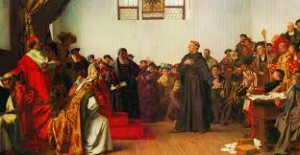
The world changed on October 31, 1517. That day, at about noon, a young German theologian named Martin Luther nailed his 95 Theses to the door of the Castle Church in Wittenberg, Germany. This action set in motion a series of events that we, today, call the Reformation and it changed world history forever.
Luther was protesting, among other corrupt practices of the Roman Catholic church, the sale of Indulgences. Indulgences were fees that were paid to the church so that the person paying could decrease their time in Purgatory after death. This was nothing short of selling salvation for money. Luther had aspired to study law but that changed one night as he was walking home in a thunderstorm. Luther feared for his life because of the ferocity of the storm so he cried out, “Saint Mary, save me and I will be a monk!” He survived the storm and so, true to his word, he entered the services of the church. It was during this time as a theologian that Luther began to doubt the teachings of the Catholic church.
The Reformation was not simply about the sale of Indulgences though. The Reformation was a complete change in Christian philosophy that had started, not with Luther, but with other dissenters like Hus and Wycliffe. John Hus of Bohemia and John Wycliffe of England had been influential Christian figures in the fifteenth century. These men believed that the Word of God was something that every Christian should read for themselves, not only the priests. This philosophy did more to cause the Reformation than Luther’s nailing of his grievances with the Church.
The map of Europe changed almost immediately. The more consolidated nations like England, France and Spain crushed dissent among the Reformers (Protestants). In Central Europe, however, the power structure was such that Lutheranism and other theological philosophies like Calvinism were able to gain a foothold in the hearts of the German, Dutch and Swiss peasantry. Scotland was also radically transformed by the Calvinism of John Knox (Presbyterianism). England also experienced a “Reformation” but this was for more political reasons than religious.
The Catholic Church did not take kindly to the dissent of the Protestants and Luther was called a heretic and outlawed. His response was this: “Here I stand. I cannot do other. So help me God.” In France, Protestant Huguenots were massacred by the Catholic monarchy. The Reformation set the stage for bitter religious intolerance within the Catholic Church and this in turn set the stage for the exodus of many Protestants to a new land–a free land. The Puritans came from England to Massachusetts Bay because of religious persecution. The battered Huguenots left France and settled in North America. Moravians, Quakers and Amish settled Pennsylvania and the surrounding regions. Seven of the thirteen original English colonies were founded for religious reasons. These included Massachusetts Bay, Rhode Island, Connecticut, Pennsylvania and the Carolinas.
The Reformation is one of the reasons that the British colonies were populated with such a religious multitude. The principles of Calvinism led to the creation of our American government. John Adams declared, “Let not Geneva be forgotten or despised. Religious liberty owes it much respect.” The First Great Awakening, a movement which John Adams credited for sowing the seeds of revolution, was spearheaded by Calvinist preachers such as Jonathan Edwards.
